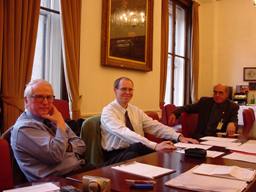
Editorial, Geoscientist 17.4 April 2007
Your bellicose Editor on the undersold virtues of conflict.
As all who know me will attest, I am a man of peace – at least when I don't have a pen in my hand. However, recent experiences have made me think that conflict fails to get the credit for the good it sometimes achieves. So - time to do a spot of rehab on the punch-up.
I am writing this in Transylvania (more about why, in a moment). But – home thoughts from abroad – I am eagerly anticipating my return for the first Burlington House Lecture on St David's Day. The inaugural talk, by Prof Dai Morgan-Evans, will describe to a capacity audience the Welsh peregrinations of scientific all-rounder Sir Joseph Banks – President of the Royal Society for a (thankfully) unequalled 41 years.
Banks was an enthusiastic geologiser but opposed attempts by Earth scientists to gain a higher profile for their emerging discipline within the Royal’s activities. Thus our 13 founders decided to establish this Society in 1807. So, while the Society of Antiquaries can claim Banks as an active member, the Geological Society can claim that but for his opposition, we might never have existed.
The Burlington House Lectures themselves would not exist but for bitter conflict. For many years, we five Courtyard societies fought the Government over our terms of occupancy. Opposing a common foe emphasised our common bonds - and led to the idea that we should build upon our enhanced cooperation by developing a series of public lectures to explore the interfaces between fine arts, chemistry, geology, biology, astronomy and archaeology. These lectures emphasise what unites us, and so celebrate, for the public benefit, the great “cultural campus” we share in the heart of Mayfair.
The country where I am writing this, Romania, shook off the yoke of dictatorship in a violent 1989 revolution that culminated in the shocking televised firing-squad execution of Nicolae Ceauşescu and his wife Elena. Now, after years of stagnation, Romania has joined the European Union - itself an organisation created out of conflict. Prosperity beckons at last, and as though to cap this overdue good fortune, in another three years Romania will host the 16th conference of the Association of European Geological Societies.
AEGS was created (by former President, Perce Allen FRS), to unite all the geological societies of Europe in response to Cold War divisions. Now, it organises affordable international meetings to help geologists in former Eastern countries reconnect with the international community of science. We all now live under the aegis of AEGS.
In find myself in Cluj-Napoca ("the heart of Transylvania") for a meeting of the AEGS Awards Committee, and am delighted to break the news that the first Percival Allen Medal for fostering international cooperation between Earth scientists has been awarded to Dr Jens Dieter Becker-Platen of Germany. Jens Dieter, a former AEGS delegate and head of BGR (Lower Saxony) played a pivotal role in the creation of EuroGeoSurveys. Also, as a man not afraid of the odd bit of confrontation when necessary, he was a key player in reforming AEGS, and planning its long road to recovery, at a pivotal meeting in Burlington House in 2000 (picture). He will be presented with the medal at MAEGS-15, Tallinn, this September (
www.maegs15.org). This magazine's congratulations go to him, with best wishes for a peaceful, conflict-free retirement.